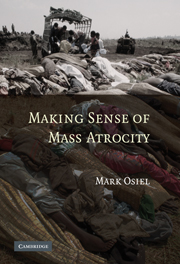1 - The Challenge of Prosecuting Mass Atrocity
Published online by Cambridge University Press: 15 September 2009
Summary
When prosecuting those at the highest echelons – a Slobodan Milošević, Saddam Hussein, or Charles Taylor – a foremost question often becomes: On what basis may the acts of the lowliest subordinate be fairly ascribed to the most elevated superior, from whom they are so distant in space and time?
Prosecutors today generally lack direct evidence that atrocities were expressly ordered from above. Since the Nuremberg trials at least, high-level perpetrators of mass atrocity have, with rare exceptions, been careful not to leave any record of such orders. For instance, testimony before the International Criminal Tribunal for the former Yugoslavia (ICTY) confirmed that Serbs “erased records and cleaned out archives.” When Argentina's military juntas gathered to plot the dirty war, their minutes expressly registered their concern to avoid “another Nuremberg.”
Even oral orders are generally couched in insinuation and innuendo, through euphemistic terms of art, which prosecutors must convincingly decode. It would not be obvious to outsiders, for instance, that satellite intercepts from field commanders referring to “Belgrade” always really meant “Milošević.” Little evidence of criminal commands was available to prosecutors at the ICTY, in fact. The court concluded it could infer their existence from circumstantial facts only if no other reasonable inference were possible. The prosecutorial burden here proved quite onerous in most cases. The law, in this respect, simply has not yet fully recognized and redressed how mass atrocity evolves in evasive response to the law's own demands on those seeking to prove it.
- Type
- Chapter
- Information
- Making Sense of Mass Atrocity , pp. 16 - 30Publisher: Cambridge University PressPrint publication year: 2009



